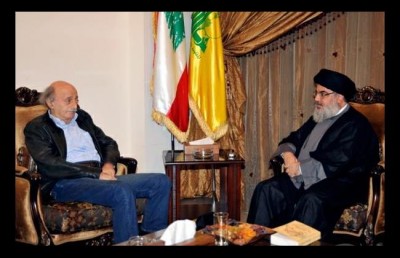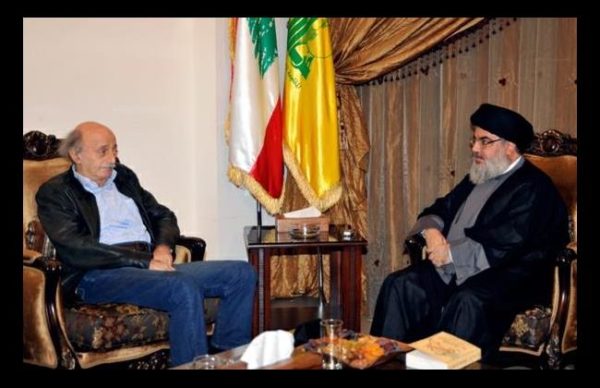 Progressive Socialist Party ( PSP) leader MP Walid Jumblatt met over the weekend with Hezbollah Secretary General Sayyed Hasan Nasrallah to discuss the presidential election, the Israeli war on Gaza and the turmoil in Syria and Iraq.
Progressive Socialist Party ( PSP) leader MP Walid Jumblatt met over the weekend with Hezbollah Secretary General Sayyed Hasan Nasrallah to discuss the presidential election, the Israeli war on Gaza and the turmoil in Syria and Iraq.
This was the first meeting between the two leaders in more than two years according to local media reports.
The meeting reportedly lasted for 2 hours and was held Saturday night at a secret location in Beirut’s southern suburb.
Describing his talks with Nasrallah as “very positive,” Jumblatt told Hezbollah’s Al-Manar TV station: “Palestine brings us together.”
Hezbollah also described the Nasrallah-Jumblatt meeting was “useful and important,” its media office reported.
“The two leaders exchanged viewpoints on a variety of domestic as well as regional and international issues, the latest developments in Iraq,” Mohammad Afif, head of Hezbollah’s media office was quoted as saying .
Presidential election
Asked if the meeting would help in breaking the presidential deadlock, Afif said: “In the first place, the meeting was not intended to provide solutions to a crisis that requires consultations among all Lebanese factions.”
Afif noted that while Hezbollah supported Free Patriotic Movement leader MP Michel Aoun for the presidency, Jumblatt backed Aley MP Henri Helou and the March 14 coalition’s candidate is Lebanese Forces leader Samir Geagea.
Nasrallah and Jumblatt reportedly stressed the need for a speedy election of a new president to end the vacancy in the country’s top Christian post, according to a statement issued jointly by the Hezbollah and PSP media offices.
Maronite Patriarch Beshara Rai, who is fed up with Parliament’s failure to choose a successor to former President Michel Suleiman whose term ended on May 25 , called for the election of a president who is neither aligned with the March 8 nor March 14 coalitions in a bid to break the 2-month-old presidential deadlock .
Syrian civil war
Afif acknowledged political differences remained between Hezbollah and Jumblatt over the Syrian war, now in its fourth year.
Jumblatt, a harsh critic of Syrian President Bashar Assad, has slammed Hezbollah’s military involvement in the war next door, calling it a historic and moral “mistake” toward the Syrian people.
Security situation
They also discussed the security situation and agreed on the need to maintain internal cohesion, bolster security measures taken to consolidate stability in the country by raising the level of coordination among security agencies.
They also discussed the political relationship between their parties, expressing intentions to further develop it. “The two sides expressed their satisfaction with the progress of the relationship between their two parties and stressed the need to develop it in order to serve the interest of the two parties and the national public interest,” the joint statement said.
Gaza war
They also discussed, Israel’s military offensive, now in third week, against the Gaza Strip, which killed more than 1,050 Palestinians and wounded over 5,000.
Declaring their solidarity with the Palestinian people and their steadfastness in confronting the Israeli occupation, “the two sides agreed that Palestine will remain the main issue, rising above any political differences.
Iraq
They both condemned the displacement and killing of Christians in the northern Iraqi city of Mosul at the hands of Islamic State of Iraq and Greater Syria (ISIS).
“They stressed the need for discussing the means to protect Iraq’s unity and its political diversity,” the statement added
No political meaning
Geagea played down the significance of the Jumblatt – Nasrallah meeting.
The meeting has no political meaning, Geagea told An Nahar newspaper in a report published on Monday.
It was held to highlight the ongoing ties between them, he said.
He denied that there were developments in the presidential deadlock.
He accused the March 8 alliance of not showing signs on its readiness to discuss the candidacy of any person other than Aoun.

